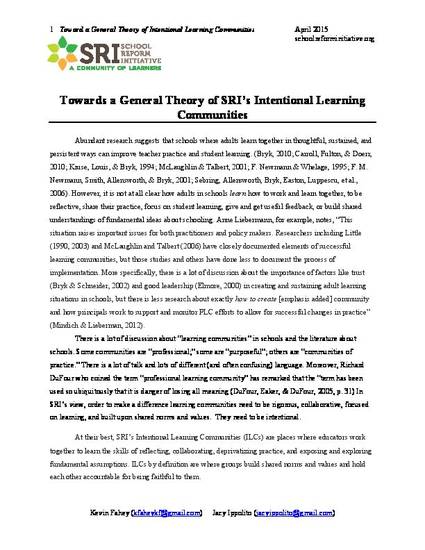
Other
Towards a General Theory of SRI’s Intentional Learning Communities
(2015)
Abstract
Abundant research suggests that schools where adults learn together in thoughtful, sustained, and persistent ways can improve teacher practice and student learning. (Bryk, 2010; Carroll, Fulton, & Doerr, 2010; Kruse, Louis, & Bryk, 1994; McLaughlin & Talbert, 2001; F. Newmann & Whelage, 1995; F. M. Newmann, Smith, Allensworth, & Bryk, 2001; Sebring, Allensworth, Bryk, Easton, Luppescu, et al., 2006). However, it is not at all clear how adults in schools learn how to work and learn together, to be reflective, share their practice, focus on student learning, give and get useful feedback, or build shared understandings of fundamental ideas about schooling. Anne Liebermann, for example, notes, “This situation raises important issues for both practitioners and policy makers. Researchers including Little (1990, 2003) and McLaughlin and Talbert (2006) have closely documented elements of successful learning communities, but those studies and others have done less to document the process of implementation. More specifically, there is a lot of discussion about the importance of factors like trust (Bryk & Schneider, 2002) and good leadership (Elmore, 2000) in creating and sustaining adult learning situations in schools, but there is less research about exactly how to create [emphasis added] community and how principals work to support and monitor PLC efforts to allow for successful changes in practice” (Mindich & Lieberman, 2012).
Disciplines
Publication Date
April, 2015
Citation Information
Jacy Ippolito and Kevin Fahey. "Towards a General Theory of SRI’s Intentional Learning Communities" (2015) Available at: http://works.bepress.com/jacy-ippolito/28/
